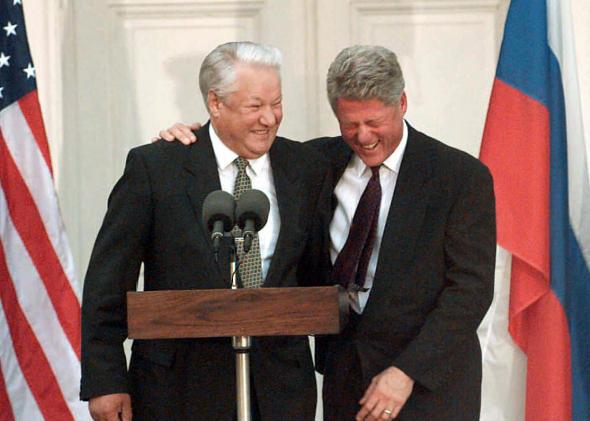Today’s big news out of Crimea is the seizure of the Ukrainian naval headquarters in Sevastopol by pro-Russian militiamen, apparently mostly unopposed. As Russia completes its annexation of the peninsula, an odd war of words has also broken out over the implications of a 1994 treaty.
After the breakup of the Soviet Union, newly independent Ukraine suddenly found itself in possession of the world’s third-largest nuclear arsenal. Though the new government originally planned to keep the Soviet nuclear weapons it had inherited on its territory, Ukraine—along with Kazakhstan and Belarus—eventually agreed to transfer the weapons to Russia for reprocessing. (Along with post-apartheid South Africa, these are the only countries to voluntarily give up nuclear weapons.)
But in return for giving up its nukes, Ukraine wanted some security assurances—leading to the 1994 Budapest Memorandum. The memorandum, signed by then-Ukrainian President Leonid Kuchma, along with Bill Clinton, Boris Yeltsin, and John Major, required that the signatories “respect the independence and sovereignty and the existing borders of Ukraine” and “refrain from the threat or use of force against the territorial integrity or political independence of Ukraine.”
According to Ukraine’s new government and its Western backers, Vladimir Putin has now egregiously violated the commitment made by his predecessor to respect Ukraine’s “existing borders.”
“One of the countries that agreed to guarantee (Ukraine’s) integrity, Russia, has on the contrary violated it,” French Foreign Minister Laurent Fabius said, arguing that Ukraine’s fate after voluntarily surrendering its arsenal could encourage other countries to acquire nuclear weapons or refrain from giving them up.
Meanwhile, Russia’s foreign ministry is accusing Western states of violating the agreement by having “indulged a coup d’etat” against Viktor Yanukovych.
The debate is mostly academic at this point, since the agreement doesn’t actually include any security guarantees for Ukraine … or at least not under these circumstances. The signatories are required to “seek immediate United Nations Security Council action to provide assistance to Ukraine” only in the event of an act of aggression “in which nuclear weapons are used.” As one international law scholar puts it, “It is binding in international law, but that doesn’t mean it has any means of enforcement.”
One odd postscript: The Budapest Memorandum isn’t actually the most arcane treaty being revisited in recent days. Take this with a sizable grain of salt, but pro-European Ukrainian activist sites, citing the Turkish media, are claiming that under the 1783 Treaty of Küçük Kaynarca between Catherine the Great and the Ottoman Empire, which recognized Russian control over the region, if Crimea declares its independence, it must return to Turkish control.
As political analyst Ceylan Ozbudak (whose official bio, caveat emptor, associates her with the nutty Islamic creationist Harun Yahya) puts it, “When Ukraine appeared as an independent nation following the disintegration of the USSR in 1991, Turkey acquired the right to claim the Peninsula back based on the Treaty of Küçük Kaynarca; however, this was not brought up by the Turgut Ozal administration of the time.” I can’t imagine why.
Turkish Prime Minister Recep Tayyip Erdoğan’s foreign policy has sometimes been described as “neo-Ottoman,” but this would be a stretch.
